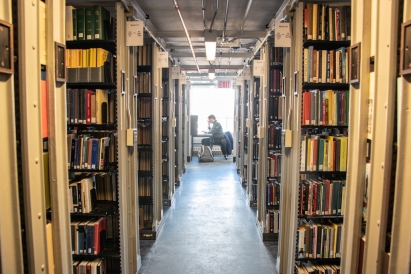

Brandon Mioduszewski


Pursuing Your Academic Interests
My favorite thing about Dartmouth by far is the opportunity to fully and wholly immerse myself in my academic interests (which, if you've been reading my other entries, are Middle Eastern culture, languages, politics, and history). While there are a fair amount of distributive requirements at Dartmouth, half of them can probably be completed within your department of interest.
Even though this is only my second term at Dartmouth, I've already had so many opportunities to take classes with the Middle Eastern Studies department. From Israeli-Palestinian politics to Arab feminism to Arabic, the options here are endless. Moreover, there is plenty more to departments at Dartmouth than simply the classes. Oftentimes, departments will host events such as public seminars, book talks, and internship opportunities to help students get even more involved in their passions. For instance, this week I attended an online book talk focused on the work of Egyptian author Ihsan Abdel Quddous, whose prolific writing catalog has not been translated into English despite its high level of popularity in Egypt; however, Dartmouth professor Jonathan Smolin took up the work of translating one of his works and bringing it to English readers. The seminar was incredibly interesting, and opportunities to learn about things like this exist in all departments.
Major departments also offer study abroad and internship opportunities associated with them; for example, the Middle Eastern Studies department sponsors a language program in Morocco, an exchange program in Israel, and an internship program in Kuwait. Hopefully I will be able to enjoy all of these experiences next year! Each department sponsors programs abroad, and most are not terribly selective because the school wants all students to have the experience to study abroad.
Finally, Dartmouth's expansive library provides an opportunity to satisfy any academic curiosity that you may have. The Stacks, our primary library, has 8 floors of books filling the shelves; personally, I have spent tons of time checking out the Arab literature and Middle Eastern history sections, but they truly have interesting subjects for anybody. Books in the Stacks can be used for class, as a supplement to material learned in class, or just books that you can read for fun.
Overall, if you have an academic interest you should be excited to pursue it at Dartmouth. The professors are incredibly willing to help you develop your knowledge, and other resources exist to further supplement your growth as a student and person. Although our 10-week terms are short, they are packed and busy, allowing you to maximize your time and grow. I am eager to continue taking advantage of the excellent opportunities available for me on campus!
Posts You Might Like

My experience in my first ever literature class!


All about Writing 5 (and my favorite watches from the course materials!)


During my sophomore spring quarter, I took on the challenge of four STEM courses, and while it has been intense, the unexpected connections across subjects and the joy of learning have made it one of my most rewarding academic experiences yet.


Hello finals week! As I close out a finals season, dive into my bag to see just what gets me through this time of the term!


On the Beijing LSA+, we have real-world Chinese practice every Friday. Last week we went to two neighborhoods, Houhai and Shichahai, and wrote a photo log about our experience. Read along to see what immersive language learning here looks like!


Curious about what a class looks like on a Dartmouth Foreign Study program? Read on!


With so many undergraduates hoping to participate in the exceptional atmosphere of the Tuck School of Business, Tuck created programs specifically designed for us. I was fortunate enough to take part in one of them: TuckLAB Entrepreneurship.



For the past few weeks I've been in Beijing on the Chinese Language LSA+. Follow along to see what I'm up to!

